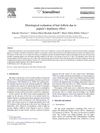
Search
for
Sort by
Research
60-90 / 1000+ results

research Trigonelline Nanocrystal-Based Topical Creams for the Treatment of Hair Loss
Trigonelline nanocrystal cream effectively promotes hair growth and may reduce side effects.

research Topical Eflornithine: Efficacy in Reducing Unwanted Facial Hair Growth in Women
Eflornithine cream effectively reduces women's unwanted facial hair but hair returns if treatment stops.

research Oral Ivermectin in the Treatment of Scabies
Oral ivermectin effectively cured scabies with minimal side effects, and finasteride promoted hair growth in men with hair loss.

research Medical Treatment of Non-Scarring Alopecia
Minoxidil and finasteride can help with hair loss, but more research is needed to improve treatments for certain types of hair loss.
research Finasteride Topical Delivery Systems for Androgenetic Alopecia
Topical finasteride can effectively treat male pattern baldness with fewer side effects than oral use.

research An Updated Review of the Sebaceous Gland and Its Role in Health and Diseases Part 2: Pathophysiological Clinical Disorders of Sebaceous Glands
Sebaceous glands are involved in various skin disorders, some treatable with medications like finasteride and minoxidil.

research A Novel Effect of Acyclovir on Hair Growth in BALB/c Mice: A Promising Future for Finding a New Topical Drug for the Treatment of Hirsutism
Acyclovir cream may slow down hair growth, suggesting it could be a new treatment for excessive hairiness.

research Treatment of Hair Loss
Finasteride and minoxidil are effective for hair loss, but continued research is needed for better treatments.

research Evidence-Based Guideline for the Treatment of Androgenetic Alopecia in Women and Men
Use minoxidil for hair loss; finasteride and dutasteride for men, dutasteride for women.

research Hair Regrowth
Finasteride and minoxidil are effective for hair regrowth, while treatments for alopecia areata have varying success and continuous treatment is necessary.

research Hair Growth and Rejuvenation: An Overview
The document concludes that minoxidil and finasteride are proven for hair growth, herbal remedies show promise, but more research is needed to confirm their effectiveness.

research Management of Hair Loss
Minoxidil and finasteride are effective for male hair loss, minoxidil for female hair loss, and various treatments like corticosteroids work for alopecia areata; treatment should be tailored to the individual.

research Treatments for Androgenetic Alopecia and Alopecia Areata
Minoxidil and finasteride treat hair loss; more research needed for other options.

research Systematic Review of Platelet-Rich Plasma Use in Androgenetic Alopecia Compared with Minoxidil, Finasteride, and Adult Stem Cell-Based Therapy
PRP injections may be a safe, effective alternative for hair loss treatment compared to minoxidil and finasteride.

research Guidelines for the Diagnosis and Treatment of Male-Pattern and Female-Pattern Hair Loss, 2017 Version
Use finasteride, dutasteride, and minoxidil for hair loss treatment.

research Effect of Citrullus Colocynthis Schrad Fruits on Testosterone-Induced Alopecia
Citrullus colocynthis fruit extract may effectively treat testosterone-related hair loss, similar to finasteride.

research Androgenetic Alopecia: Treatments and Efficacy
Finasteride and minoxidil are effective FDA-approved treatments for androgenetic alopecia.

research Novel Agents for the Treatment of Alopecia
New treatments for hair loss show promise, especially finasteride for men and a stronger minoxidil formula.

research Anti-Androgen Treatments for Hirsutism and Acne in Women of Childbearing Age
For women with moderate to severe unwanted hair growth or acne, birth control pills are the first choice, with other medications like cyproterone, spironolactone, flutamide, or finasteride as alternatives, and permanent hair removal should be done with electrolysis or laser.

research Ginsenoside F2 Reduces Hair Loss by Controlling Apoptosis Through the Sterol Regulatory Element-Binding Protein Cleavage Activating Protein and Transforming Growth Factor-β Pathways in a Dihydrotestosterone-Induced Mouse Model
Ginsenoside F2 may help prevent hair loss and promote hair growth better than finasteride.

research Treatment Options for Alopecia
The document concludes that oral finasteride and topical minoxidil are effective for genetic hair loss, while other treatments for different types of hair loss show promise but need more research.

research Androgenetic Alopecia: Combining Medical and Surgical Treatments
Minoxidil, finasteride, and hair transplantation combined give best results for hair loss.

research An Update on Hair Restoration Therapy
Hair restoration techniques like follicular unit transplant surgery and follicular unit extraction are effective, with ideal graft placement density between 20-30 units per cm². Medications like Minoxidil and Finasteride can help maintain and regrow hair.

research Histological Evaluation of Hair Follicle Due to Papain's Depilatory Effect
Papain cream removes hair better than papain gel, causing hair follicles to widen and skin to thicken.

research Nocebo Effect in Dermatology
Negative expectations can cause adverse effects in dermatology treatments, like with finasteride for baldness, and careful communication can help reduce these nocebo responses.
research Physicochemical Characterization of Finasteride Nanosystem for Enhanced Topical Delivery
Chitosan-decorated finasteride nanosystems improve skin retention and could be a better treatment for hair loss.
research Atypical Post-Finasteride Syndrome: A Pharmacological Riddle
Finasteride and dutasteride can cause severe, lasting side effects.

research Optimal Management of Frontal Fibrosing Alopecia: A Practical Guide
Early diagnosis and combination therapy, especially with finasteride and dutasteride, are key to managing Frontal Fibrosing Alopecia effectively.

research Androgenetic Alopecia: Overview
AGA is a genetic, hormonal hair loss treated with finasteride, minoxidil, and supplements, but new compounds are being developed.